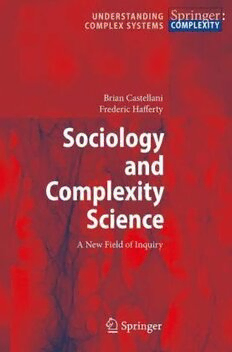Download Sociology and Complexity Science: A New Field of Inquiry PDF Free - Full Version
Download Sociology and Complexity Science: A New Field of Inquiry by Brian Castellani, Frederic William Hafferty (auth.) in PDF format completely FREE. No registration required, no payment needed. Get instant access to this valuable resource on PDFdrive.to!
About Sociology and Complexity Science: A New Field of Inquiry
This book is the first to identify and review the new field of study, sociology and complexity science—or SACS for short. SACS is comprised of five cutting-edge areas of research: computational sociology, the British-based School of Complexity (BBC), complex social network analysis (CSNA), sociocybernetics and the Luhmann School of Complexity (LSC). Together, these five areas represent the latest development in complexity science and sociological systems thinking, offering researchers a powerful, new set of tools for addressing the growing complexity of sociological inquiry.This book also showcases a new method for modeling social systems, called the SACS Toolkit. The SACS Toolkit comes with a theoretical framework (social complexity theory), procedural algorithm (assemblage) and recommended toolset for modeling social systems (qualitatively, historically or numerically) from the ground-up. In fact, this book uses the SACS Toolkit to review the new field of SACS.The third feature of this book is its compendium of maps, graphs and figures—all located in one chapter. Demonstrating the visual ingenuity of complexity science method, this compendium provides a picture-book tour of the new field of SACS.Finally, this book comes with a companion website—an internet resource for exploring the new science of complexity and its intersection with sociology; and for downloading the maps (in color) used in this book. Useful for teachers, students and researchers, this book articulates a possible future for social scientific inquiry in the 21st century.
Detailed Information
| Author: | Brian Castellani, Frederic William Hafferty (auth.) |
|---|---|
| Publication Year: | 2009 |
| ISBN: | 9783540884613 |
| Pages: | 292 |
| Language: | English |
| File Size: | 6.028 |
| Format: | |
| Price: | FREE |
Safe & Secure Download - No registration required
Why Choose PDFdrive for Your Free Sociology and Complexity Science: A New Field of Inquiry Download?
- 100% Free: No hidden fees or subscriptions required for one book every day.
- No Registration: Immediate access is available without creating accounts for one book every day.
- Safe and Secure: Clean downloads without malware or viruses
- Multiple Formats: PDF, MOBI, Mpub,... optimized for all devices
- Educational Resource: Supporting knowledge sharing and learning
Frequently Asked Questions
Is it really free to download Sociology and Complexity Science: A New Field of Inquiry PDF?
Yes, on https://PDFdrive.to you can download Sociology and Complexity Science: A New Field of Inquiry by Brian Castellani, Frederic William Hafferty (auth.) completely free. We don't require any payment, subscription, or registration to access this PDF file. For 3 books every day.
How can I read Sociology and Complexity Science: A New Field of Inquiry on my mobile device?
After downloading Sociology and Complexity Science: A New Field of Inquiry PDF, you can open it with any PDF reader app on your phone or tablet. We recommend using Adobe Acrobat Reader, Apple Books, or Google Play Books for the best reading experience.
Is this the full version of Sociology and Complexity Science: A New Field of Inquiry?
Yes, this is the complete PDF version of Sociology and Complexity Science: A New Field of Inquiry by Brian Castellani, Frederic William Hafferty (auth.). You will be able to read the entire content as in the printed version without missing any pages.
Is it legal to download Sociology and Complexity Science: A New Field of Inquiry PDF for free?
https://PDFdrive.to provides links to free educational resources available online. We do not store any files on our servers. Please be aware of copyright laws in your country before downloading.
The materials shared are intended for research, educational, and personal use in accordance with fair use principles.

